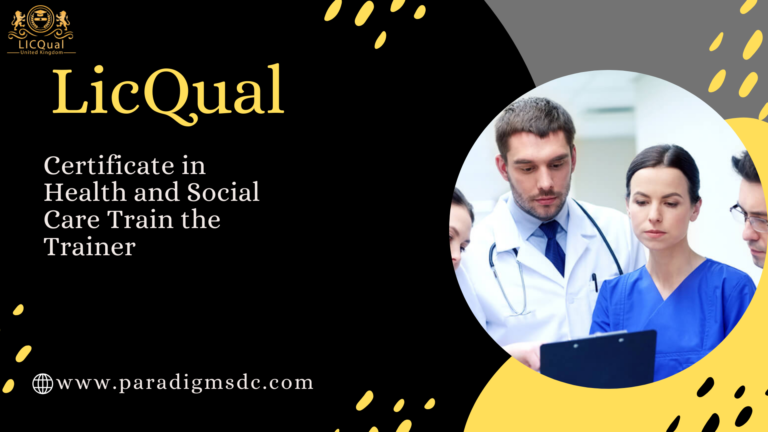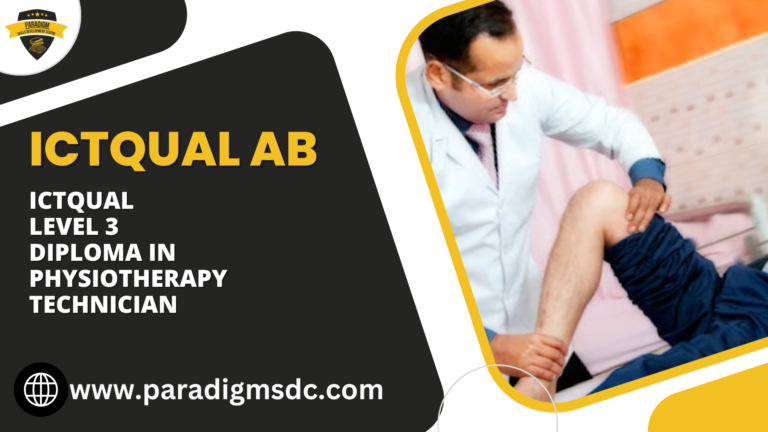Course Introduction
The ICTQual Level 2 Award in Health and Safety in Health and Social Care is designed to equip individuals working in these sectors with essential knowledge and skills to ensure safety in their workplaces. This qualification is crucial for maintaining high standards of health and safety, which are paramount in environments where care and support are provided to vulnerable individuals.
Course Overview
This course provides a foundational understanding of health and safety principles specific to health and social care settings. It covers essential topics such as risk assessment, handling hazardous substances, infection control, and emergency procedures. Participants will learn how to identify and mitigate risks effectively, promoting a safe and secure environment for both staff and service users.
Course Study Units
The study units typically include:
- Understanding Health and Safety in Health and Social Care Settings
- Risk Assessment and Management
- Infection Control
- Safety Procedures and Emergency Preparedness
- Health and Safety Management
- Ethical Considerations in Health and Social Care
Learning Outcomes
By the end of the course, participants will:
Understanding Health and Safety in Health and Social Care Settings
- Knowledge of Legislation and Regulations:
- Understand relevant health and safety laws, regulations, and guidelines applicable to health and social care settings.
- Identify key responsibilities of employers, employees, and regulatory bodies in ensuring compliance with health and safety standards.
- Promotion of Safety Culture:
- Recognize the importance of promoting a culture of safety within the workplace.
- Demonstrate an understanding of how positive safety practices contribute to the well-being of service users and staff.
- Risk Awareness:
- Identify common hazards and risks present in health and social care environments.
- Understand the potential consequences of failing to address these risks effectively.
Risk Assessment and Management
- Risk Identification:
- Develop skills in identifying potential hazards and risks specific to health and social care settings.
- Utilize appropriate tools and techniques for conducting thorough risk assessments.
- Evaluation and Control:
- Evaluate the severity and likelihood of identified risks.
- Implement effective control measures to mitigate or eliminate risks where possible.
- Risk Management Strategies:
- Develop risk management strategies tailored to the unique needs and challenges of healthcare and social care environments.
- Demonstrate the ability to prioritize risks and allocate resources efficiently.
Infection Control
- Understanding of Infection Prevention:
- Understand the principles of infection prevention and control.
- Identify common routes of infection transmission in healthcare settings.
- Implementation of Control Measures:
- Implement appropriate infection control measures to prevent the spread of infections, including hand hygiene, personal protective equipment (PPE), and environmental cleaning protocols.
- Monitoring and Compliance:
- Monitor compliance with infection control procedures and guidelines.
- Recognize the importance of ongoing surveillance and outbreak management.
Safety Procedures and Emergency Preparedness
- Emergency Response Protocols:
- Understand the importance of effective emergency response protocols in healthcare and social care settings.
- Demonstrate knowledge of evacuation procedures, emergency communication systems, and first aid protocols.
- Equipment Maintenance and Readiness:
- Ensure that emergency equipment and systems are properly maintained and regularly tested.
- Demonstrate readiness to respond to emergencies by participating in training and drills.
Health and Safety Management
- Policy Development and Implementation:
- Develop and implement health and safety policies and procedures tailored to the needs of the organization and its service users.
- Ensure that policies are communicated effectively to staff and stakeholders.
- Monitoring and Review:
- Monitor compliance with health and safety policies and procedures.
- Conduct regular reviews and audits to identify areas for improvement and address any deficiencies.
Ethical Considerations in Health and Social Care
- Ethical Awareness:
- Understand the ethical principles and values underpinning health and social care practice.
- Recognize the importance of upholding service users’ rights and dignity in all aspects of care provision.
- Integration of Ethics and Safety:
- Identify ethical considerations related to health and safety practices in healthcare settings.
- Demonstrate an understanding of how ethical considerations intersect with safety protocols and procedures.
Course Benefits
- Enhanced Safety: Participants gain practical skills to create safer working environments, reducing accidents and promoting well-being.
- Compliance: Achieving this qualification ensures compliance with legal requirements and organizational policies.
- Career Advancement: It enhances career prospects within the health and social care sector, demonstrating commitment to professional development and safety standards.
Who is This Course For?
This course is ideal for:
- Caregivers and Support Workers: Those directly involved in providing care and support in health and social care settings.
- Healthcare Assistants: Individuals assisting healthcare professionals in various capacities.
- Administrative Staff: Personnel handling administrative tasks within health and social care organizations.
Future Progression for This Course
Successful completion of the ICTQual Level 2 Award in Health and Safety in Health and Social Care can lead to:
- Further Qualifications: Progression to higher-level health and safety qualifications or related courses.
- Career Development: Enhanced skills and knowledge can lead to senior positions within health and social care settings.
- Specialization: Opportunities to specialize in specific areas of health and safety management or related disciplines.
Conclusion
The ICTQual Level 2 Award in Health and Safety in Health and Social Care is essential for anyone looking to ensure safe practices and environments within health and social care settings. It provides foundational knowledge, practical skills, and a pathway to career advancement in this vital sector. Investing in this qualification not only enhances individual competence but also contributes to the overall quality of care provided to vulnerable individuals.
Would you like any adjustments or additions to this blog post draft?







